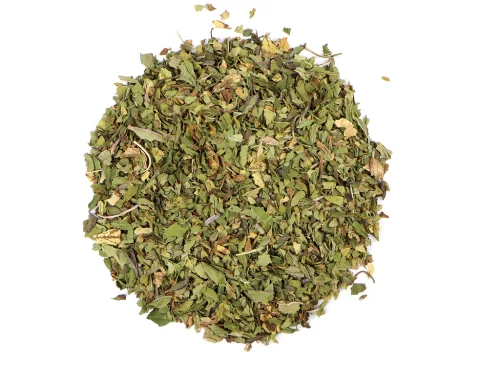
Peppermint (Mentha piperita)
Peppermint is a hybrid of spearmint and watermint. It has a spicy refreshing flavor that makes it a popular ingredient in many different foods, candies, and desserts, among others. The leaves of this plant are the primary parts that are used, due to the presence of the essential oil, which contains high levels of menthone, menthol, limonene, and various other acids, compounds, and antioxidants.
The plant is native to Europe and the Middle East and is now considered invasive species in many other parts of the world, including United States, Australia, New Zealand, and the Galapagos Islands, among others. These aromatic plants prefer to grow in moist and damp areas and grows by putting out runners, rather than reproducing via seed dispersal.
You will find Peppermint Essential Oil in Mother Jai’s All Natural Mouthwash

Mouth Wash – 16oz Bottle
Shake, swish, and gargle for a clean and healthy mouth, naturally.
Benefits of Peppermint
Peppermint tea and the natural compounds found in peppermint leaves may benefit your health in several ways. Peppermint oil is used for a long-term disorder of the large intestines that causes stomach pain (irritable bowel syndrome or IBS). It is also used for indigestion (dyspepsia), spasms in the bowel, hard, painful breasts in breast-feeding women, bed sores (pressure ulcers), and tension headache.
Alleviate Chemotherapy Symptoms: capsules containing peppermint oil reduced incidence and severity of nausea and vomiting in a study in 200 people undergoing chemotherapy for cancer.
Clear Sinuses: Peppermint has antibacterial, antiviral and anti-inflammatory properties. Because of this, peppermint tea may fight clogged sinuses due to infections, the common cold and allergies. Additionally, research demonstrates that menthol, an active compound in peppermint, improves the perception of airflow in your nasal cavity. Therefore, steam from peppermint tea may help you feel as though your breathing is easier.
Freshen Breath: the antibacterial effects of peppermint oil kill bacteria in the mouth that cause bad breath.

Focus & Concentration: In one study, 24 young, healthy people performed significantly better on cognitive tests when they were given peppermint oil capsules. In another study, smelling peppermint oil was found to improve memory and alertness.
Improve Allergy Symptoms: Peppermint contains rosmarinic acid, which has been shown to reduce allergy symptoms, such as sneezing and runny nose.
Improves Digestion: Peppermint may relieve digestive symptoms, such as gas, bloating and indigestion. Animal studies indicate that peppermint relaxes your digestive system and may ease pain. It also prevents smooth muscles from contracting, which could relieve spasms in your gut.
Prevent Infection: as an antibacterial peppermint can kill and prevent the growth of common food borne bacteria including E. coli, Listeria and Salmonella. Peppermint has also been shown to effectively kill staphylococcus and pneumococcus bacteria.

Reduces Fatigue: peppermint is stimulating to the mind and body. Without the side effects of caffeine, it can increase energy levels and reduce daytime fatigue.
Relieve Migraines & Tension Headaches: In one randomized clinical study in 35 people with migraines, peppermint oil applied to the forehead and temples significantly reduced pain after two hours, compared to a placebo oil. In another study in 41 people, peppermint oil applied to the forehead was found to be as effective for headaches as 1,000 mg of acetaminophen.
Soothe Cramps: as a muscle relaxant peppermint can relieve muscle cramps as well as menstrual cramps. In one study in 127 women with painful periods, peppermint extract capsules were found to be as effective as a non-steroidal anti-inflammatory drug in reducing the intensity and duration of pain.

Using Peppermint
Peppermint has several uses both medicinal and culinary, including:
Oil: The oil is commonly applied to the skin to release inflammation and soothe respiratory problems.
Tea: Drinking peppermint tea is an excellent way to relieve stress and anxiety and boost energy levels.
Tinctures and Extracts: These are typically used in a higher concentration for internal healing and more serious health conditions.
Flavoring Agent: This plant is also a popular flavoring agent in many foods, candies, beverages, and baked goods.

Side Effects of Peppermint
There are no known side effects of consuming peppermint tea.
Peppermint essential oil is highly concentrated and can be irritating to the digestive tract when taken internally which may lead to diarrhea.
Many people are allergic to this plant and will experience contact dermatitis when touching any of these substances.























